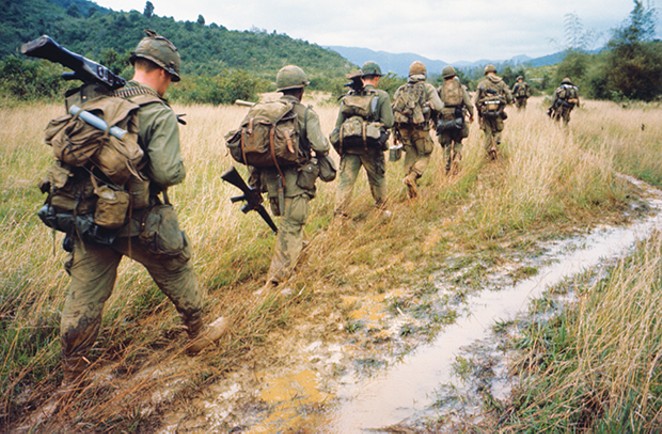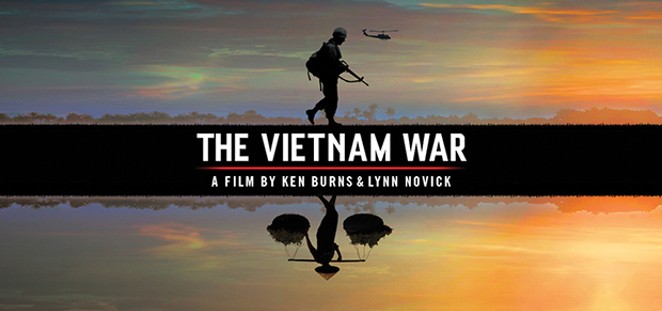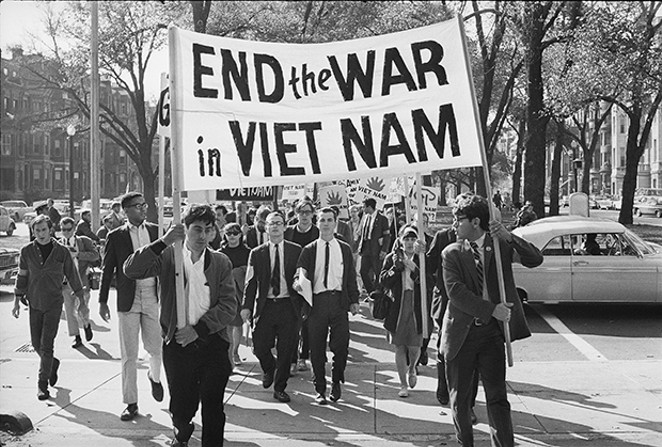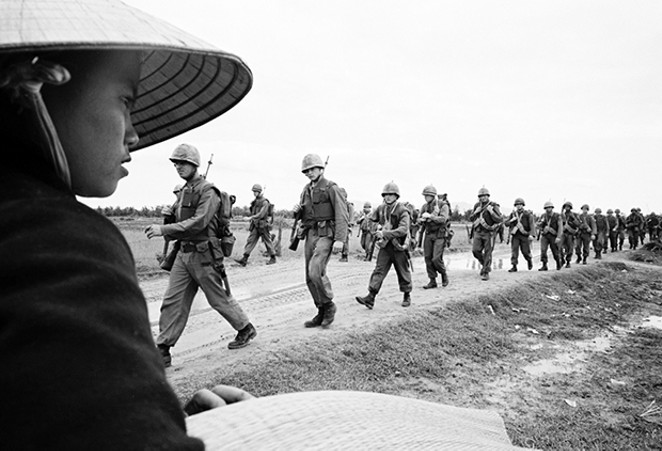
“By the time we got off the train in Mattoon, we had agreed to write. I would keep him abreast of the antiwar movement at home and he would tell me what Vietnam was really like.”
Twenty-nine years ago in these pages, I shared letters from Tom, a soldier reluctantly serving in Vietnam. The 1988 dedication of the Illinois Vietnam Veterans Memorial had inspired me to dig out the letters I had kept through many moves.
Now Ken Burns and Lynn Novick have brought “The Vietnam War” to light with their 10-part documentary on PBS. The series has many of us thinking about that war again. In the midst of downsizing this summer, I came across the letters and moved them once again. The time seems right to share them a second time, to remind us of the tremendous cost we pay in an ill-conceived war.
It was spring 1969 when I met Tom on the train north from Carbondale. I was a first-year student at Eastern Illinois University returning from a carefree weekend. To pass the long ride, we talked about the war. This was a topic of great concern to Tom, for while I could look forward to peace marches in Charleston and return trips to Carbondale, he had a much larger journey looming. Tom had been drafted and had completed basic training. He was home on leave before shipping out to Vietnam.
By the time I got off the train in Mattoon, we had agreed to write. He was eager to keep abreast of the antiwar movement in the States, and I wanted to hear firsthand about Vietnam. I soon learned that he could clearly and honestly convey a young soldier’s thoughts, thoughts surely shared by thousands of others fighting in that war.
To protect Tom’s family and friends, I edited the letters with no last name. It seems irrelevant in many ways because Tom could be anyone’s son, brother, boyfriend or husband.
His letters from Vietnam:
May 16, 1969
Dear Mary,
Wow, I’m here. What a place. After a 20-hour flight, two weeks of processing in, six days of in-country training, 50 gallons of water and 49 gallons of sweat, here I sit, on a bunk in Lai Khe, or so it’s more commonly called “ROCKET CITY.” They ought to start coming in anytime now.
Two things have impressed (or depressed) me since I have been in Vietnam. The first is the extreme poverty of the Vietnamese people. The second is the attitude of the GIs toward the Vietnamese. I’ve ridden a bus through urban and semi-urban areas where the shops and houses, if you could call them houses, were made of crude sheets of tin and scraps of wood. You’ve seen old small-town or neighborhood garages with junk laying in the “yard”: worse.
I feel so sorry for these people. Seeing all the little kids and realizing that the great majority of them will miss so much of life before conditions improve and seeing the old people who have spent their entire lives in the most minimal of existences gives you a pretty low feeling. The conditions in the rural areas are even worse, where the villagers, knowing little of politics, are pushed and pulled by Viet Cong and government forces alike.
The second thing that bothers me is the way many American soldiers feel toward the Vietnamese. Perhaps it’s because the GI does not particularly want to risk his life for the “political freedom” of a strange people in a hot, wet, distant corner of nowhere. It’s not hard to see why he often develops a hostile attitude toward people who sell him Cokes during the day and shell him with mortars at night. “They all look the same.”
We were at a rifle range in the 1st Div. training areas eating lunch when a group of kids came up begging for C-rations. We were told not to give them any because we were told it would discourage their self-sufficiency. The validity of this decision is irrelevant when judging the actions many soldiers took. The kids were first met with hostile language from vulgarity to “go get your older sister, gook.” From there they (the GIs) progressed to flipping food at them with spoons, and pretty soon there was a steady barrage of cans and dirt clods. These nine- or ten-year-olds hung around for some reason until the garbage got really thick. I was so disgusted I got up and walked away from my “friends.” Some of the comments you hear are really unbelievable. The gap between official policy and reality is an abyss.
I’m hurting for some sleep so I had better quit. If you were able to read this you were really lucky (or unlucky) or a skilled decoder since I’ve been stretched out on one of those patented Vee-shaped army bunks with the famed u-sag springs and floor-duster mattress.
Sincerely 351 days to go,
Tom
June 14, 1969
Dear Mary,
I got your letter the other day and there are a couple of things you brought up that I feel compelled to comment on. Why don’t we get out of Vietnam? 1. There are too many individuals in high places who want to maintain the status quo and retain their influence. 2. I’m convinced that the Vietnamese economy rests entirely on the 40-cent Coke. If the GIs pull out, the Coke market collapses and consequently the entire economy collapses. Thirdly, the South Vietnamese army would really be in a bind if they were forced to participate in the war effort. I’ve yet to see a Vietnamese soldier with a uniform as dirty as mine after I’ve worn it for one day. They do all their fighting in the village bars. I’ve seen them fish in the Nook River with hand grenades. I’m certain that most of their casualties come from grenades thrown in shallow water, a touch of humor not void of truth.
The action has been picking up around here. We pulled security up for a road sweep for about two weeks straight. The day we turned it over to another platoon, they were ambushed. Four guys were killed and several trucks were hit by R.P.G.’s (rocket-propelled grenades). Friday the 13th a 122-mm rocket (about six ft. long) scored a direct hit on our three-seat crapper and blew it away. The only thing left was a piece of tin roof about 40 feet up in a rubber tree. Several days ago on a sweep I walked right up to a tripwire. It was a thin yellow wire tied to a bush about six inches off the ground. The other end was free. I figure maybe a cow or some other animal set it off before I got there or the V.C. who rigged it up was scared off before he could do the job right. At any rate, if there had been a grenade on the other end it would have definitely messed up my health record.
I’ve heard about the 25,000-man token withdrawal. They are all coming, from what I hear, from the 9th Div. in the Delta and Marines up north. That kind of brackets me. A mech unit won’t have much chance of being pulled out early anyway. One of the 1st Div. mottos is “first in, last out” so take it from there. We modify that to “first in, first out” (by medevac). We are all patiently awaiting Tricky Dick Nixon’s unveiling of “the secret plan” to get us out of Vietnam. We hope it does not interfere with the “peace talks.”
Tom
June 18, 1969
Dear Mary,
We’ve been working a clearing operation now for the last three days. Two days ago while we were clearing a road into our present camp, our scout stepped on a mine, killing himself and wounding four others. I was within 10 feet of the blast but somehow I was not hurt.
Today we found a V.C. camp but there were no V.C. around, fortunately. I don’t tell my parents any of this or they would worry themselves to death.
The sun is deserting me now so I’ll have to close. The only thing I can think of is: what a waste. I hope your summer is going better than mine.
Your time is coming, Uncle Sam
The anti-warrior,
Tom
July 23, 1969
Dear Mary,
I would have written sooner – in fact I did, two pages yesterday, mostly “war stories.” I soon got disgusted at them so I gave them the pitch – but my limited natural ability to coordinate ideas, time and paper has been further limited by the monsoons. The rain comes every afternoon and sometimes lasts till early morning.
As to what you should write – anything! Good times, bad times, thoughts, comments, experiences, anything. I really look forward to hearing from you. I’ve got to keep in touch with the world.
Talk about people dodging reality. I’ve never seen such a concentration of grass anywhere. I have taken no surveys, but I would guess, conservatively, that 50 percent of the guys in my company smoke marijuana regularly. You don’t have to look far to catch a pill popper either. It’s hard to blame anyone for escaping from this “reality.”
Would you believe it’s taken me three hours just to get this far? Free time comes in five-minute increments. I should have a little more time now because the track just broke down, out in the sticks, of course.
This place is a land of smells. I wish I could describe them. I have yet to smell any good smells. The villages smell unique, the vegetation smells unique, and the water buffalo smell, wow! You would never believe the smell that just zapped me, way out in the boonies. I could not believe it – my old nemesis CS, riot gas. The worst experience of my life was the CS chamber in basic training. Fond memories recalled.
It must be about eight now. The track was “fixed” and broke down again. I am at this time on ambush. The moon is bright enough for me to almost write legibly. I was determined to finish this letter today, but the moon is predictably going behind a cloud.
Tom
July 29, 1969
Dear Mary,
You thought I was in the thick of the fighting. Not so. V.C. are very much more active both north and south of here. The Au Chau Valley and some remote areas of the Delta are the worst spots right now. They brought tracks into the valley just last month. Hamburger Hill is in the valley.
The Army has taught me one thing that I didn’t really have as a civilian. Sustained hatred has become a significant, if uncomfortable, part of my existence. But I don’t hate what the Army wants me to hate. Each day my hatred of the military system, which affects the lives of every human being in the world, grows. Someday when I am no longer under the sword of Damocles that is the Uniform Code of Military “Justice,” which can sentence a man to six years for singing “We shall overcome,” I’m going to put more than a little effort into “subverting” any and all military organizations in sight. Incidentally, you knew that the initial sentences for the Presidio “Mutineers” ranged up to 16 or 17 years. Yet people let it happen in the land of the free and the home of the brave.
My parents write what parents are expected to write. My brother sends some good books that help me keep in touch. You would not believe the mental stagnation in the military. Keep in touch. I need all I can get to buffer this incredible B.S.
The anti-warrior,
Tom

Oct. 11, 1969
Dear Mary,
I promised that I would write again. Right now I am in Di An (pronounced Zee-ahn) on what is known as a stand-down. It amounts to three days off the line in a secure area. Di An is where Nixon visited the “war zone.” There are many more V.C. in Charleston, Illinois, than Di An.
As to where I am: the 1st Div. has three main base camps, all situated on Highway 13. From south to north and from most secure to least secure, they are Di An, Lai Khe and Quan Loi. Being “mechanized,” I am likely to be anywhere in this area of operation. Di An is about 10 minutes north of Saigon and Quan Loi is about 70 miles north of Di An, with Lai Khe about halfway in between.
The terrain and vegetation ranges from flat and pretty open down south to flat with a lot of jungle bracketing Lai Khe for about 20 minutes on each side. Lai Khe itself is in an old rubber plantation but rubber is scattered in the area. Lai Khe is called “Rocket City” because of the number of 107-mm and 122-mm rockets that the V.C. aim there.
Nearing Quan Loi the flat land becomes hilly (nice for ambushes) and the rubber plantations seemingly go on forever. Irrigation ditches about three feet deep lace the rubber on the hillsides. They make natural dug-in fighting positions for the NVA (North Vietnamese) to ambush from and natural barriers to slow our tracks down and force us to stick pretty much to the roads, which are often mined.
We were up north of Quan Loi around An Loc from the first of August to the last of September. We were in the two worst contacts the company has been in since I’ve been here, about six months now. The Cambodian border is near An Loc and the North Vietnamese use the area as a staging area for actions down toward Saigon. The NVA usually travel in very large groups and are well-equipped. They definitely have guts to attack tracks. In addition to being ambushed and mortared by NVA, we were strafed by our own helicopter gunships, and one man was killed when one of our own gunship rockets went down his driver’s hatch. In the dense rubber, the air support can’t see anything but leaves. A bad area to be in.
We are back down south now around Lai Khe in the dense jungle. The V.C. down here travel in small groups and are easily intimidated by the 50-cal machine guns on our tracks.
About a week ago we found a large weapons cache. A defector led us to twenty-four 30-cal. Machine, ninety 75-mm recoilless rifle rounds, two complete 82-mm mortar positions, seven claymore antipersonnel mines and 50,000 AK47 rounds. Later we picked up quite a few mortar rounds and RPGs.
So much for where I am.
Lately my “work” day has been a full 24 hours long. The ground has been so muddy that we can’t use the tracks for recon-in force (RIF) missions so we walk all day. At night we walk to an ambush site and spend the night in the rain. You would not believe how cold it gets toward morning. Back in to the Remain Over Night position, where the tracks are set up, to eat and then back out on foot is par for the course.
So much for the war bullshit.
Sometime in December or January I am going to Hong Kong on leave. Hong Kong is a free port and I plan to buy a lot. Prices on binoculars, photographic equipment, clothes and electronic equipment are fantastic! Savings of over 50 percent are common. Quality is good if you know what you are buying. A Yashica Electra 35, which sells for $115 in the world, can be had for $45 or $50 in Hong Kong. At prices like that you can afford to invest a little more. If there is anything along any of these lines you would like, let me know, and I will try to pick it up for you. Financial details can be worked out later.
I have heard a lot about the Oct. 15 moratorium. Is there much happening on any of the Illinois state university campuses? While I was back in the world, I understood Eastern was a pretty nonpolitical campus.
I have to quit now. It’s 12:30 a.m. and I have to get up at six. Write when you can.
The unwilling GI,
Tom
P.S. Your package was FANTASTIC (and only a little stale). Packages take over a week to reach here. It was much appreciated.
Department of the Army Headquarters
US Army Military Mail Terminal
San Francisco, California
20 November 1969
Dear Miss Painter,
The enclosed mail, addressed to Specialist Four Thomas …, bears your return address. I regret to inform you that Specialist … died on 25 October, 1969.
Please accept my deepest sympathy over the loss of Specialist … . I am truly sorry that it was not possible to have delivered this mail to him.
Sincerely,
Thomas C. Adams
Lieutenant Colonel, AGC Commanding
Mary Painter Bohlen of Springfield taught journalism for 28 years at University of Illinois Springfield.



